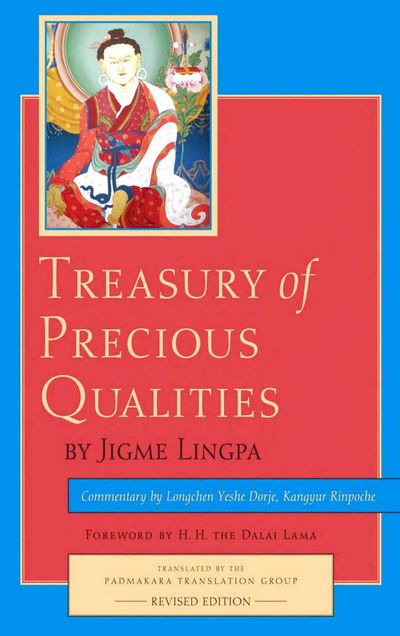Treasury of Precious Qualities: Book One (2010)
< Books
| Line 308: | Line 308: | ||
*{{i|The four periods reflected in the existence of an individual being|365}} | *{{i|The four periods reflected in the existence of an individual being|365}} | ||
*{{i|The ceaseless continuity of the process of formation and destruction|366}} | *{{i|The ceaseless continuity of the process of formation and destruction|366}} | ||
| + | |||
*{{i|APPENDIX 2 The bardo|369}} | *{{i|APPENDIX 2 The bardo|369}} | ||
| Line 313: | Line 314: | ||
*{{i|The six uncertainties of the bardo of becoming|369}} | *{{i|The six uncertainties of the bardo of becoming|369}} | ||
*{{i|How to benefit the consciousness of beings in the bardo|371}} | *{{i|How to benefit the consciousness of beings in the bardo|371}} | ||
| + | |||
*{{i|APPENDIX 3 The four truths|373}} | *{{i|APPENDIX 3 The four truths|373}} | ||
| Line 318: | Line 320: | ||
*{{i|The meaning of the term "four truths"|374}} | *{{i|The meaning of the term "four truths"|374}} | ||
*{{i|A sequential exposition of the four truths|374}} | *{{i|A sequential exposition of the four truths|374}} | ||
| + | |||
*{{i|APPENDIX 4 The five aggregates|377}} | *{{i|APPENDIX 4 The five aggregates|377}} | ||
| + | |||
*{{i|APPENDIX 5 A Buddha's qualities of realization|387}} | *{{i|APPENDIX 5 A Buddha's qualities of realization|387}} | ||
| + | |||
*{{i|APPENDIX 6 The five paths and the thirty-seven elements leading to<br>enlightenment|391}} | *{{i|APPENDIX 6 The five paths and the thirty-seven elements leading to<br>enlightenment|391}} | ||
| + | |||
*{{i|APPENDIX 7 The two truths|397}} | *{{i|APPENDIX 7 The two truths|397}} | ||
| Line 333: | Line 339: | ||
*{{i|Divisions and categories of the two truths|400}} | *{{i|Divisions and categories of the two truths|400}} | ||
*{{i|The necessity and benefits of establishing the two truths|410}} | *{{i|The necessity and benefits of establishing the two truths|410}} | ||
| + | |||
*{{i|APPENDIX 8 The Madhyamika school|413}} | *{{i|APPENDIX 8 The Madhyamika school|413}} | ||
| Line 347: | Line 354: | ||
****{{i|An investigation into the nature of phenomena: the Great Interdependence argument and the argument of "Neither One nor<br>Many"|427}} | ****{{i|An investigation into the nature of phenomena: the Great Interdependence argument and the argument of "Neither One nor<br>Many"|427}} | ||
**{{i|''Why the Madhyamika dialectic is superior to all other tenet systems''|428}} | **{{i|''Why the Madhyamika dialectic is superior to all other tenet systems''|428}} | ||
| + | |||
*{{i|APPENDIX 9 The twenty-one qualities of Dharmakaya wisdom|431}} | *{{i|APPENDIX 9 The twenty-one qualities of Dharmakaya wisdom|431}} | ||
| + | |||
*{{i|APPENDIX 10 The three doors of perfect liberation| 437}} | *{{i|APPENDIX 10 The three doors of perfect liberation| 437}} | ||
Revision as of 13:58, 28 August 2020
This book is a translation of the first part of Jigme Lingpa's Treasury of Precious Qualities, which in a slender volume of elegant verses sets out briefly but comprehensively the Buddhist path according to the Nyingma school. The concision of the root text and its use of elaborate poetic language, rich in metaphor, require extensive explanation, amply supplied here by the commentary of Kangyur Rinpoche.
The present volume lays out the teachings of the sutras in gradual stages according to the traditional three levels, or scopes, of spiritual endeavor. It begins with essential teachings on impermanence, karma, and ethics. Then, from the Hinayana standpoint, it describes the essential Buddhist teachings of the four noble truths and the twelve links of dependent arising. Moving on, finally, to the Mahayana perspective, it expounds fully the teachings on bodhichitta and the path of the six paramitas, and gives an unusually detailed exposition of Buddhist vows. (Source: Shambhala Publications)
| Citation | Fletcher, Wulstan, and Helena Blankleder (Padmakara Translation Group), trans. Treasury of Precious Qualities: The Rain of Joy; Book One. By Jigme Lingpa ('jigs med gling pa). With The Quintessence of the Three Paths, a commentary by Longchen Yeshe Dorje, Kangyur Rinpoche (klong chen ye shes rdo rje, bka' 'gyur rin po che). Boston: Shambhala Publications, 2010. |
|---|---|


